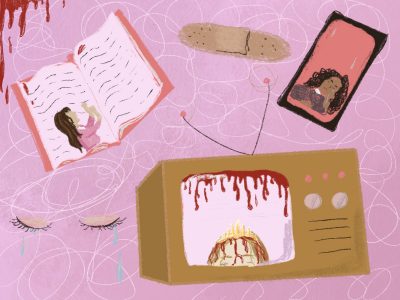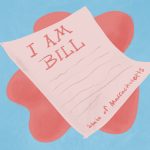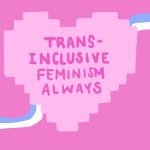The world is enraptured by female suffering. A woman with substance abuse issues, mental illness or unhealthy relationships with men is the subject of drama, entertainment and intrigue. People gather to see her on screen in “Euphoria,” “Fleabag” and “Game of Thrones.” And she’s not necessarily fictional, either — books, music and movies are sensationalized by their creator’s borderline martyred reputation, as with Sylvia Plath, Amy Winehouse, and Marilyn Monroe.

There’s something about these women that girls all over the world resonate with. There’s something distinct about their tragedies that capture our hearts and minds — it’s a shared experience.
As evidenced by a wave of funny new phrases in the pop culture vernacular — feminine urge, girl dinner and “I’m just a girl” — the gender binary is alive and well in our society. To quote @jaboukie on X, “the gender binary is to gen z as harry potter houses are to millennials.”
I just mean to point out that we are living in a framework of the gender binary, for better or for worse. “Female suffering” is a comprehensible term in this framework. It implies that there is a suffering unique to women. And I kind of understand it, too. I empathize with female suffering in a way that feels especially personal. I can’t help but watch a girl grappling with a difficult psychosocial plot and think “damn, she’s so me.”
And sure, hurting is not exclusive to women. Everyone suffers. But there’s an element of rawness and relatability when it’s a fellow girl. Which begs the question: Is being a woman inherently painful? Is suffering a byproduct of girlhood?
Once we start to talk about women’s suffering, we run the risk of creating Women’s Suffering, which is, in theory, a special type of pain reserved just for us girls. I hesitate to make that conclusion. Why does being a girl have to come with its own brand of pain?
There are the stereotypes we all know: the damsel in distress, the promiscuous cheerleader, the drama queen, the grunge druggie. All are girls undoubtedly going through some complex pain, and yet they’re such flat characters. To reduce girls to their most dramatically dire moments feels reductive, objectifying and punishing.
But it’s the truth: Women suffer. Whether we talk about it or not, it’ll happen. So the question becomes: How do we depict women’s pain without contributing to its fetishization?
It seems like a vicious cycle. No matter how pure your intentions, even putting any of women’s pain out there could perpetuate its use as entertainment. And some part of me gets it — suffering is entertaining, and I don’t think consuming media with female suffering makes you a bad person. Actually, that kind of stuff is near impossible to avoid.
I think it comes down to this: The world makes women suffer, women make themselves suffer and, for a very long time, they suffered alone. Now, they see representations of themselves everywhere, which is both empowering and unpleasant.
These dark, bad, shameful parts of ourselves are depicted for all to see, and we try to assuage them with sarcasm or judgment. “She’s so stupid,” we think to ourselves, watching a misguided heroine make yet another self-destructive decision. And yet to some extent, we’ve all been there. We see ourselves in her in a way that makes us uncomfortable because it confronts the girl we don’t want to be — the girl who suffers. She’s a stereotype brimming with victimhood and self-pity and no one likes her, although they watch her like how you’d watch a car crash. We want to be anyone but her.
Therein is the real danger of perpetuating the female suffering cycle. If we distance ourselves from bad sad mad girls, we’re missing a big piece of our own selves, whether we’d like to admit it or not.
We should be able to talk about our pain, shortcomings, self-destruction, mental illness, unhealthy relationships and every other tragic, sensitive, taboo thing we go through. It’s not to glamorize or to romanticize. It’s an exercise against shame and jadedness and detachment. Recognizing pain is the first step in recognizing something beyond it. Once you look past your wounds, you’ll realize: Well, that’s me and I have this wound and it hurts and that’s okay but it’s only one part of me. I’m so much more than that.
Suffering is not the only trait women have — I’d argue that we know joy and wonder and community just as well, if not better.
We also have to critically reflect on our fascination with suffering because although it may make for good entertainment, in order to ever move past it, we have to place an equal — if not more — value on healing and getting better.
Simone de Beauvoir said “One is not born, but rather becomes, a woman.” You’re not doomed to become the female suffering stereotype, just as much as you’re not fated to be one who detaches herself from her own hurt. Become the woman you want to be, in all her glory and all her pain.














